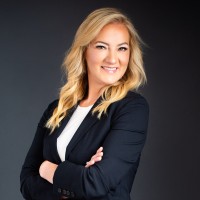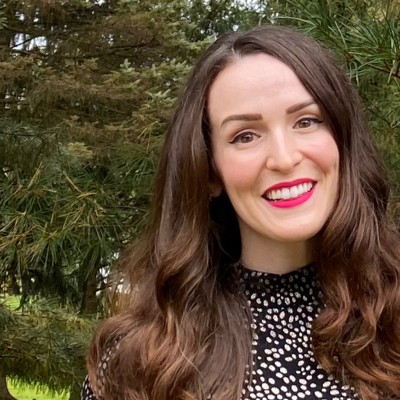Episode 112: Jen Scandariato on Embracing a Winning Mindset for Professional Growth
3.4K Views | 18 Min Read
Shawnna Sumaoang: Hi, and welcome to the Sales Enablement PRO podcast. I am Shawnna Sumaoang. Sales enablement is a constantly evolving space and we’re here to help professionals stay up to date on the latest trends and best practices so that they can be more effective in their jobs. Today I’m excited to have Jen for joining us. Jennifer, I’d love for you to introduce yourself, your role within your industry to our audience.
Jen Scandariato: Sure. Thanks for having me. I’m excited to be here. And, so call me Jen. Jennifer, sometimes I feel like it’s my father yelling at me because I’m in trouble. I am a female in tech, or women in tech. I’ve been doing this for about 25 years. Out of school, I wanted to be an accountant. I went to go work for a CPA firm, and after about six months, I was like, yeah, this isn’t for me. So, I went back to school and studied and started in IT and I’ve been in IT for over 25 years.
SS: Well, Jen, we’re really excited to have you. And as you mentioned in your intro, you’ve been a strong advocate for women in tech and women in business. So, could you give us some insights into your own journey navigating the industry and really being able to rise to leadership levels throughout your career?
JS: Yeah, it’s been interesting. Nothing is like straight up or straight across, it’s definitely a wiggly line as you build your career, as most people know. When I was done with the CPA firm, I went to go work in computers. I was really excited about IT. And somebody had mentioned it’s a man’s world and I’m like, what are you talking about? I don’t think so. And my next trip, after that conversation, I was on the bus heading to go get my rental car after I flew into an airport and I looked around and it was all men. I’m like, “they’re so right. This is a man’s world”. I never recognized that.
I think what the reason why I’m so passionate about females in tech is I’ve noticed in conversations with the other females, they would say, “Oh, this job description says, they’re looking for a rock star and I just won’t apply.” And I’d be like, “That’s crazy. Don’t you think you’re a rock star?” And they’re like, “It just describes a very competitive environment that I’m not interested in.” And if I wasn’t in it, I would definitely be in psychology because that piqued my interest. I was like, “Tell me more. I need to understand this. Why would you feel that way?” So, it’s definitely been a journey for me, but I think because of my ability to take risk and just dive right in and kind of lead into projects. I can never recognize the imbalance of men versus females until it was brought to my attention.
SS: That’s absolutely fantastic. And I think you’re absolutely right. I think there is a psychological element to that sometimes with women. I remember the meme that was going around when Kanye West said that he was going to run for president. I couldn’t agree more, and I think the same thing exists with women that are in sales enablement, because there is a technical and a sales component to that, and both have historically been predominantly male-dominated roles. So, I’m really excited to have you here to talk to us about this. I’d love to learn from you some of the things that have worked well for you in particular. I know mentorship has been helpful in your professional development. So, can you tell us a little bit about how that’s helped you evolve?
JS: Yeah, I would say that I didn’t really have formal mentors. I think I’m mature enough in my career that it was prior to people telling you, make sure you have a mentor and make sure you have a sponsor. I think what I did was I wanted to surround myself with people that were brilliant and then I could learn from. You never want to be the smartest person in the room because then you aren’t learning anymore and growing. They always say, if you’re in your comfort zone, and you’re not taking risks then you’re not learning. I think my aptitude to learn and grow was just an important part of my career development. I just had that affinity to take on the world.
I do recommend now to have individuals be that sponsor or be that mentor. And it doesn’t have to be a formal conversation. I think it’s about finding people that you admire, and you want to emulate. I think you could have, you know, it’s difficult in the virtual world to have a cup of coffee with somebody these days but if you could saddle up with them and learn by their example and then emulate that in your real world, I think those are the best mentors when it’s unofficial, you know?
But I do believe you need a sponsor, you need somebody advocating on your behalf when you’re not in that room and in order to do that I think it’s important to tell your supervisors and people that you work with that you’re looking for an adventure, you’re looking for a new opportunity. You want to raise your hand and take on something that maybe is out of your comfort zone, out of your wheelhouse. When you put it out there that you’re looking for more opportunity and you’re raising your hand people are much more willing to give you that opportunity and give you that room to grow. You have to have trust though. So, I think it’s important that you set yourself up for success, show your capability on what you can do, and then people will trust you.
I’ll give you a great example. I worked with somebody and I was mentoring her. She was one of my managers when I was a director of one of the companies and she would sit at the back of the room on the side, she would never sit at the table. And she’s like, “I really want to take on some more responsibility.” And I said, “All right, your homework is to be at the table this next meeting.” And she’s like, “What does that have to do with anything?” I said, “It’s about being visible. It’s about being present. You’ve got a seat at the table, it’s my responsibility to make sure you’ve got a seat at the table.” These are our future leaders, right? So, she did her homework. The next meeting we had, she sat at the table and the person next to her happened to be male and said, “Hey, it’s so good to see you at these meetings. You should have been here months ago.” And she looked at me and acknowledged she wasn’t seen. It’s a very, very powerful thing, but very, very important.
SS: Absolutely. Now, to tweak the verbiage a little bit. What advice do you have for how people can cultivate these kinds of meaningful, beneficial sponsorship relationships to basically help support their professional development goals?
JS: That’s a tough one. I think you have to deliver. I think you have to deliver, so I’ll give you a great example. So, I just started a new role. It’s at a company called FINRA. We are big data. We’re dedicated to investor protection and market integrity. We regulate about 3,700 security firms, which is representative about 99% of US equities in the market transactions.
We process 135 billion market events every day. This is like really, really big stuff. And when I started, so I think I’m on day 41 or 42. So starting a new job in a pandemic is a whole different podcast. But, the very first thing I wanted to do was to set up meet and greets. I wanted to be with my team to get to know them better and build a relationship. And you’re having to do this on zoom right now, which is fine. And then you also want to meet with your business stakeholders. These are your end-user customers. You want to establish a relationship with them, and you don’t want to just talk about the good stuff, you want to talk about the bad stuff. You want to talk about the elephants in the room that say, “Hey, if I had to do something better, what would it be? What do I need to focus on?”
You’ve got to deliver. And I think when you deliver and go back to those business stakeholders and said, “I heard you. Here’s what I’m working on. Just so you know, this is important to me.” They tend to give you a sense of respect and loyalty, and that’s how you build trust. So, I would say that you have to rely on the relationships you have trust with. You can’t just ping your CIO and say, “Hey, can you mentor me for 30 minutes tomorrow?” That probably won’t be as meaningful.
SS: Absolutely. I couldn’t agree more. Now I want to pivot just a little bit, because you recently wrote an article on LinkedIn where you discuss the concepts of a winning mindset. And that’s also a concept that is well understood in the sales enablement space, where basically it’s the ability to take that negative feedback and apply it constructively. So, for those in the audience that aren’t as familiar with that I’d love for you to explain to them how can people use criticism as an opportunity for personal development?
JS: Oh boy, that article was very cathartic for me. I had a couple of weeks where I had received some negative feedback that I didn’t necessarily agree with. I hadn’t really taken a moment and recognize this individual was giving me information and actually doing me a favor by raising my awareness on a particular situation. And whether or not it’s reality or perceived, I had to use that information. I did a little bit of soul searching. Again, I didn’t really agree with it, but it made me recognize that even though that might not be true feedback, in my opinion, I needed to change my approach and either over articulate or really change something with the way that I was handling a particular situation. So it actually turned into a very positive outcome.
I quoted somebody in the article that said, “Change your perspective and understand that knowing something could be your biggest opportunity for growth and success, embrace it.” It really is about perspective and having that information allowed me to be able to pivot and really change.
But it wasn’t easy. The immediate reaction that you have when you get negative feedback is to be defensive about it. Right? When you really just take a moment, take a step back and say, this is actually doing me a favor. That’s that positive mindset and it provides your biggest opportunity to potential, right? You got to embrace it as a gift of growing and learning and it’s just one of those hurdles you’ve got to get through.
So, I could have totally taken it badly. I’m a little bit of a type-A personality and a perfectionist, and it definitely did hurt. It hurt my confidence. It wasn’t really like an ego thing. I thought I was doing a great job in this particular area. It was the ability to pivot, change my perspective, tackle it head-on, and fix it. And it was a really positive outcome. And I was talking to somebody who had a similar situation and they were like you’ve got to write about this. And I’m like, “Really? It’s kind of personal.” But, I’m totally happy to write about it if it can help other people. And there’s been multiple people on LinkedIn since I wrote that article, I think it’s got so many thousands of views and people still to this day, I received something yesterday that said it was very inspirational. So, I’m glad it helped.
SS: Oh, absolutely. Now to give our audience a little bit of additional guidance around this from the perspective of a manager or even someone sponsor how can they give feedback so that it’s more positively received on the other side but also to help ensure that their teams grow from that feedback.
JS: Yeah, that’s a tough one. People don’t like confrontation in general, right? There’s hesitation to say anything negative or hurt anybody’s feelings. And my mantra is you always have to get feedback often in real-time, in the moment. I’m not a really big fan of giving performance reviews once or twice a year. I really think it’s important to give immediate feedback when a situation occurs and the language that I like to use when I work with individuals and I’m in a leadership role and I have to course-correct and give people feedback if something was different than what I had expected.
I basically say, “here’s what I was expecting, and this is how you delivered. And please take this as not criticism, take it as an opportunity to kind of knock it out of the park next time.” If you can use this information, this only helps you. It has nothing to do with me, but the more successful your team is, the more successful you are. So, you really, you have to have trust to be able to have that open dialogue though. So, I do go back to that trust. It’s a very important thing. Try not to be critical, just be open and honest, and humble about it.
I took a leadership class early on in my career. And it said every negative, critical feedback you give an individual, we’re all humans, you have to have seven positive things for them to be equal. Seven. You can’t be like, “That’s a beautiful shirt you’re wearing today.” Like, that’s not one of them. You have to make it meaningful. Like if they do something good, you’ve got to say, “That was awesome. I appreciate you going above and beyond. I recognized you stayed late for this.” That builds them up so that when you do have to give them some negative feedback, it doesn’t completely deplete them as a performer, as an individual. So constructive feedback is really important for everybody. At the end of my one-on-ones or skip-level one-on-ones I asked them like, “What could I do differently? Am I doing all the things you need from me?” So, make it two ways. Don’t make it just one way.
SS: I love that advice and I think that’s spot on. Jen, I’ve really enjoyed this conversation. To close out, based on your own experience, I’d love some advice on key ways individuals can really to take ownership of their own career trajectory and personal growth.
JS: Yeah, personal growth is a really interesting one. Again, go back to get out of your comfort zone and learn, grow, take a new class. There’s so many offerings right now, especially in the zoom world we’re zoom, zoom, zooming. You know, join a network, whether it’s a woman in tech or an agile meetup or tech meetup. Find your passion and surround yourself with people that share that passion.
I would say the second part of that I would recommend is really around your brand. You have to figure out, like, what is your brand? What are you telling people when they meet you? What is your passion? Who am when I’m meeting with people, do I say, “I’m a mother of two teenagers?” Do I say, “I’m a woman in tech?” Do I say, “I love big data.” Like you have to have kind of like that tagline. I think you surround yourself with those allies and those mentors and this is great advice. Somebody told me this, and I never thought about this before. You want to be that person that people want on their team, not the person that they run away from you.
So, if you think about what are the behaviors and things that you have to be involved with and do, and you’ve got to build this confidence, you’ve got to show what you’re capable of so that people are like, “Hey, I need you on my team. I want you.” So, you really want to be sought after, and then that will help you grow. And I always look for the win-win, you know, how can you help somebody else and also, benefit some of your growth opportunity in the process. It’s always about a win-win.
SS: This has been fantastic advice, Jen. Again, thank you so much for joining us today. I enjoyed this conversation.
JS: Thank you. I really appreciate the opportunity.
SS: To our audience, thanks for listening. For more insights, tips, and expertise from sales enablement leaders, visit salesenablement.pro. If there’s something you’d like to share or a topic you’d like to learn more about, please let us know. We’d love to hear from you.














